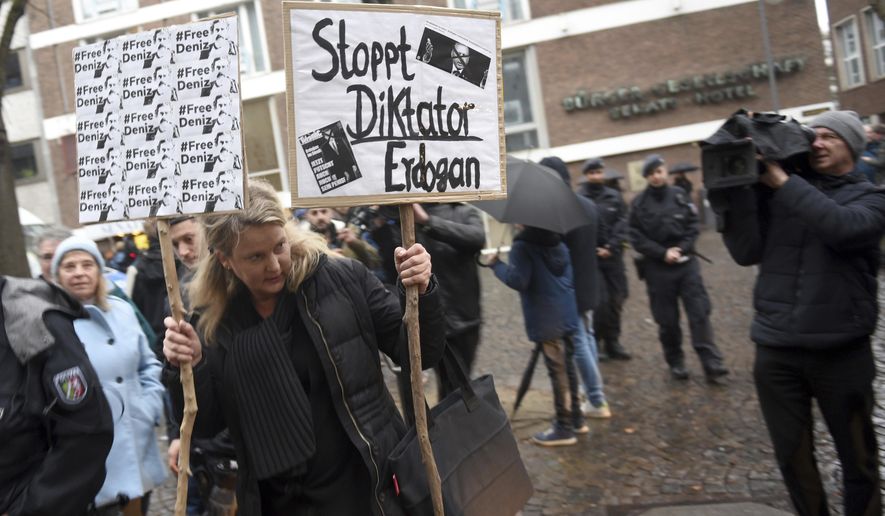BERLIN (AP) - The Latest on diplomatic rift between Turkey and EU nations (all times local):
1:10 p.m.
Germany’s defense minister is calling for a de-escalation of tensions with Turkey that center on Turkish ministers’ plans to campaign in Europe for a new constitution.
Ursula von der Leyen said after European Union foreign and defense ministers met in Brussels: “What is decisive for us is that we de-escalate now … that we become more objective again in terms of tone.”
Foreign Minister Sigmar Gabriel noted that Germany has long been a target of Turkish parties’ campaigning, and that President Recep Tayyip Erdogan himself has campaigned in Germany before. He said: “The events themselves must be held in such a way that everyone is sure they won’t be used to whip up emotions so much that afterward we can’t ensure security in our own country.”
Gabriel added: “One thing is clear. We all have an interest in domestic political tensions in Turkey not being imported to Germany.” But he stressed that authorities back freedom of expression and that it’s normal for Turkish politicians to want to address their compatriots.
___
12:15 p.m.
Chancellor Angela Merkel’s spokesman says the German government “strongly rejected” the equation of modern Germany with Nazi Germany, adding that such comparisons minimized the crimes of the Nazis.
Steffen Seibert’s remarks came Monday, a day after Turkish President Recep Tayyip Erdogan accused Germany of “Nazi practices” in response to local German authorities preventing a Turkish minister from speaking at a rally.
Seibert noted that there were strong social, economic and military ties between Germany and Turkey, but acknowledged that there were “far-reaching differences of opinion” between Berlin and Ankara at the moment.
He says Turkish officials had a right to the same freedom of speech and assembly as others do in Germany, but insisted that appearances needed to be transparent and permitted by (local) authorities.
Seibert added: “Let us keep a cool head.”
___
11 a.m.
Austria’s foreign minister says his country should make clear that it won’t accept campaign appearances by Turkish officials rather than waiting for a European debate on how to handle such matters.
Sebastian Kurz said as he arrived at a meeting of European Union counterparts in Brussels that “our Austrian solution should be clear: we will not accept any campaign appearances by Turkish politicians in Austria.”
He added that “we don’t want campaigns from other states to be brought to Austria and conflicts from other countries imported … that is always damaging for integration.”
Luxembourg Foreign Minister Jean Asselborn said that “normally you would have to think that democracy is strong enough to cope with this.” But he added: “it is also absurd that someone uses the opportunity here in Europe to defend a constitution in which the state of law is only a chimera.”
Asselborn said that finding the right approach isn’t easy and it can’t be decreed from Brussels.
___
10:55 a.m.
Germany’s foreign minister is stressing the need to “normalize” what he calls a “highly strained” relationship with Turkey.
Sigmar Gabriel sounded skeptical Monday about calls from some other European Union ministers to consider EU-wide rules for campaign appearances by foreign politicians. A central element in the current tensions is plans by Turkish ministers to campaign in Germany and elsewhere for a new constitution that would give President Recep Tayyip Erdogan greater powers.
Gabriel said as he arrived at a meeting of foreign ministers in Brussels: “Every country has its own opinion, and there is certainly a clear legal situation in Germany.”
He added: “I think the main thing is that everyone uses the possibilities they have to ensure that we get back to a somewhat normal relationship.”
___
10:40 a.m.
European Union foreign ministers arriving at a meeting in Brussels say that there may be lessons to be drawn from the spat between Turkey and Germany on campaigning by officials from outside the 28-nation bloc.
Slovak Foreign Minister Miroslav Lajcak says that the controversy highlights the lack of European rules and standards on allowing rallies by politicians from non-member countries.
He says that “it’s about time to start discussing it. I think there should be rules. I would be rather restrictive, because as we can see it has a huge damaging potential.”
Diplomatic tensions have been rising in recent days amid Turkish plans to have government ministers to address rallies in Germany and the Netherlands in support of an upcoming constitutional referendum that would give President Recep Tayyip Erdogan new powers.
___
9:35 a.m.
German Chancellor Angela Merkel’s chief of staff has condemned remarks by Turkey’s president accusing Germany of “Nazi practices,” days after a local authority prevented a Turkish minister from addressing a rally there.
Peter Altmaier on Monday called President Recep Tayyip Erdogan’s remarks “absolutely unacceptable.”
He told German public Television ARD that “Germany cannot be outmatched regarding the rule of law, tolerance and liberality.”
He said the government was in contact with Turkey’s government and announced that “we will make sure the significance of the problems of what happened in recent days will be recognized and understood in Ankara as well.”
Germany-Turkey diplomatic tensions have risen amid Turkish plans to have government ministers address rallies in Germany in support of an upcoming constitutional referendum that would give Erdogan new powers.




Please read our comment policy before commenting.